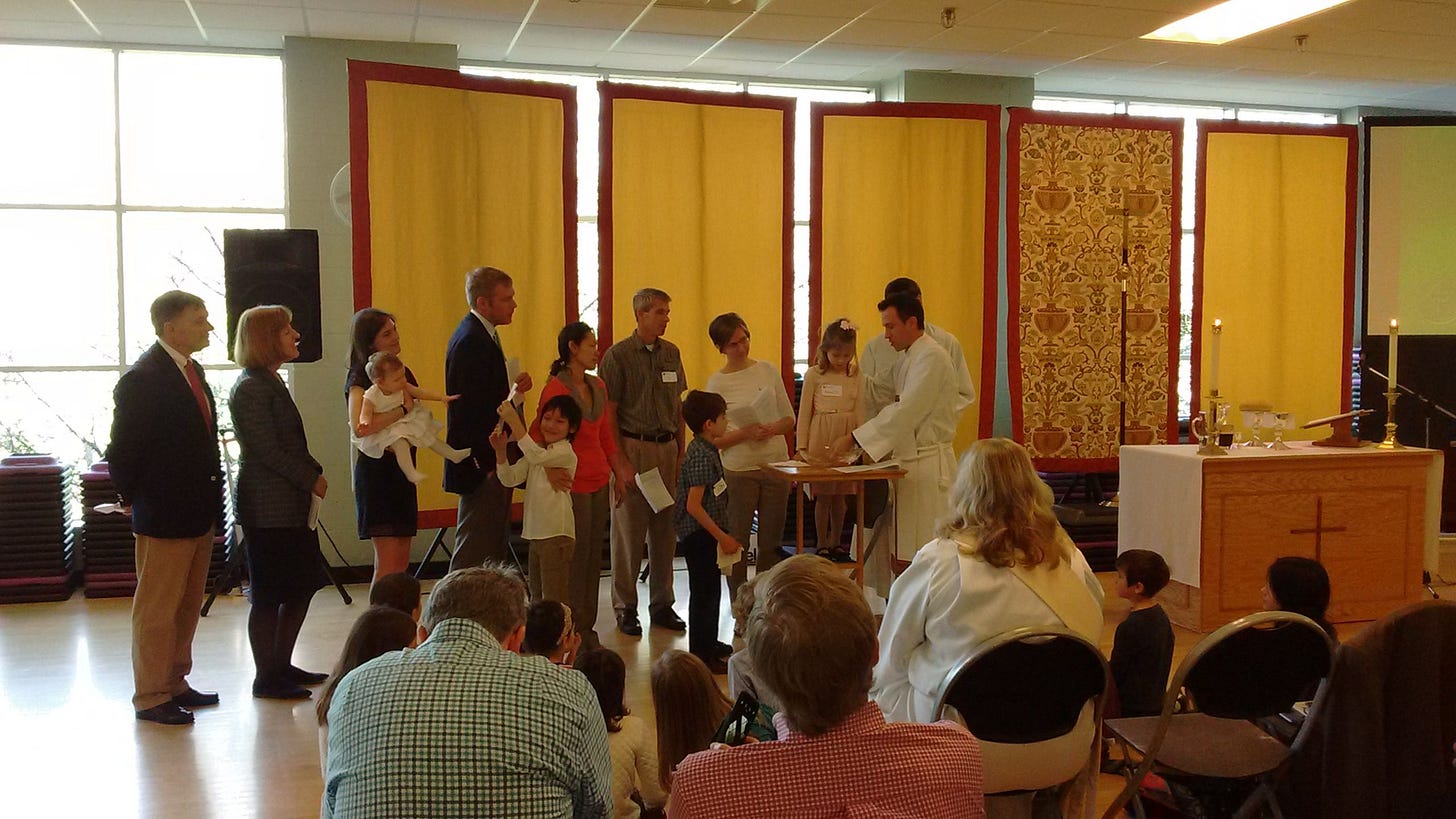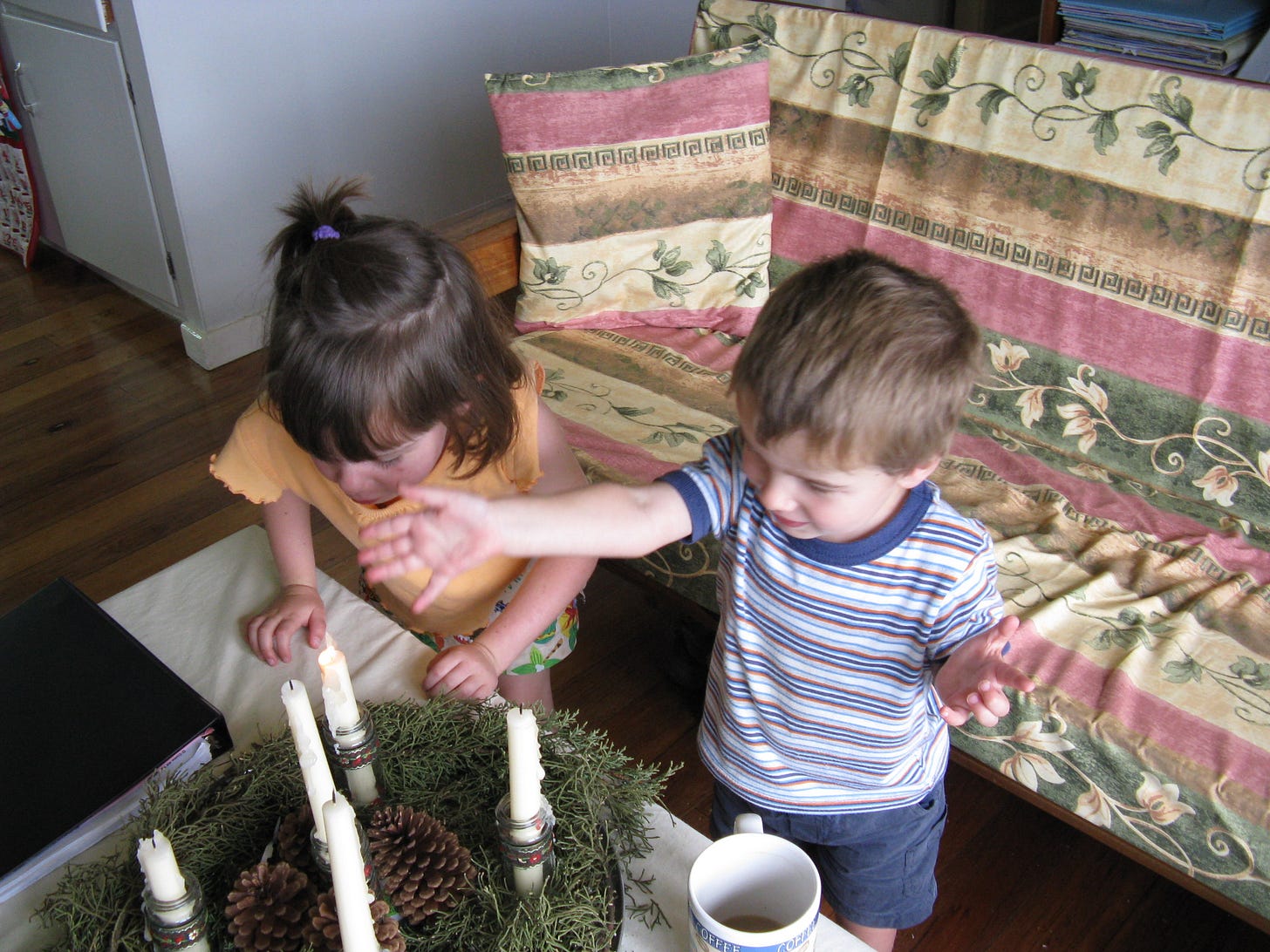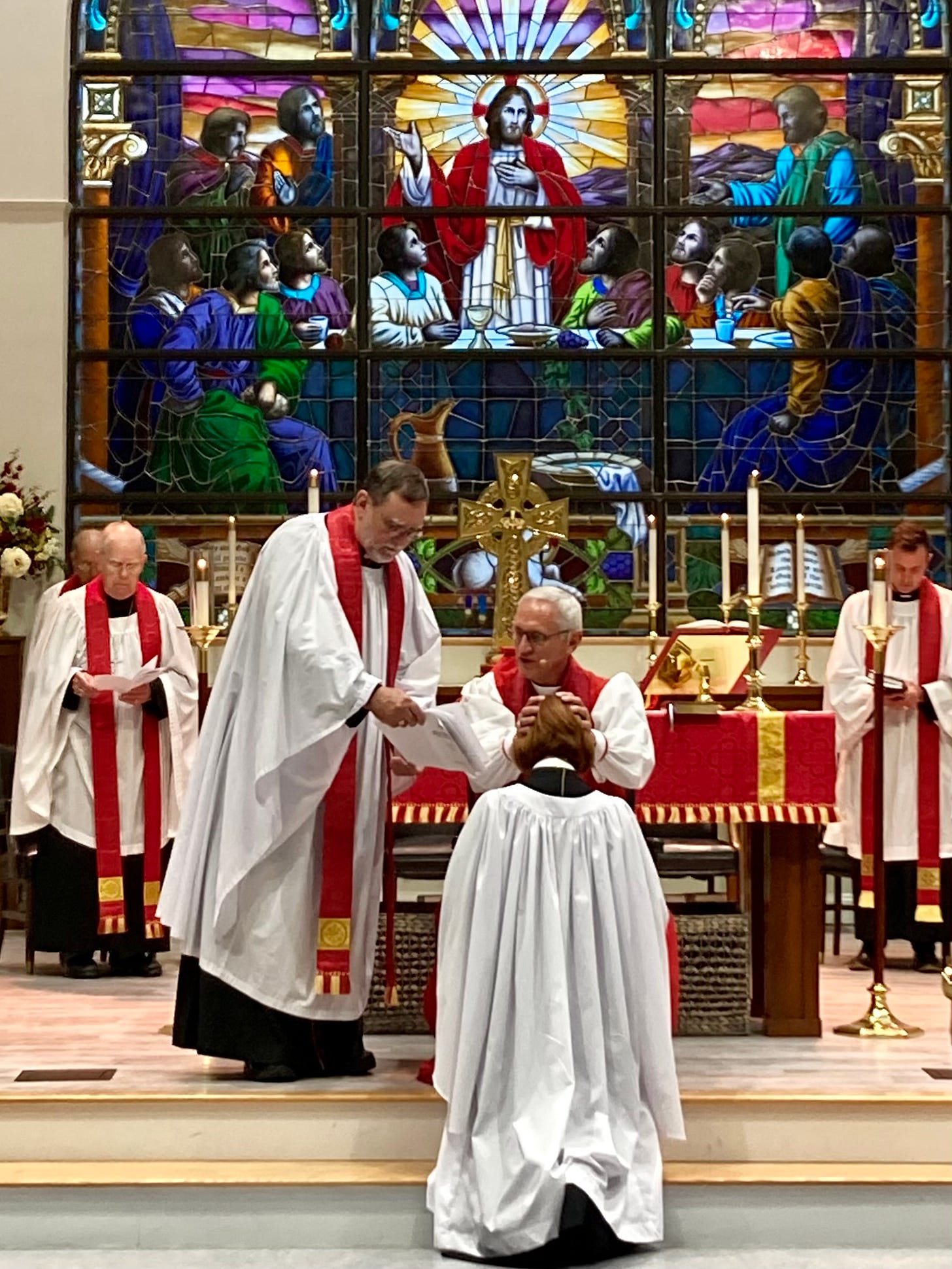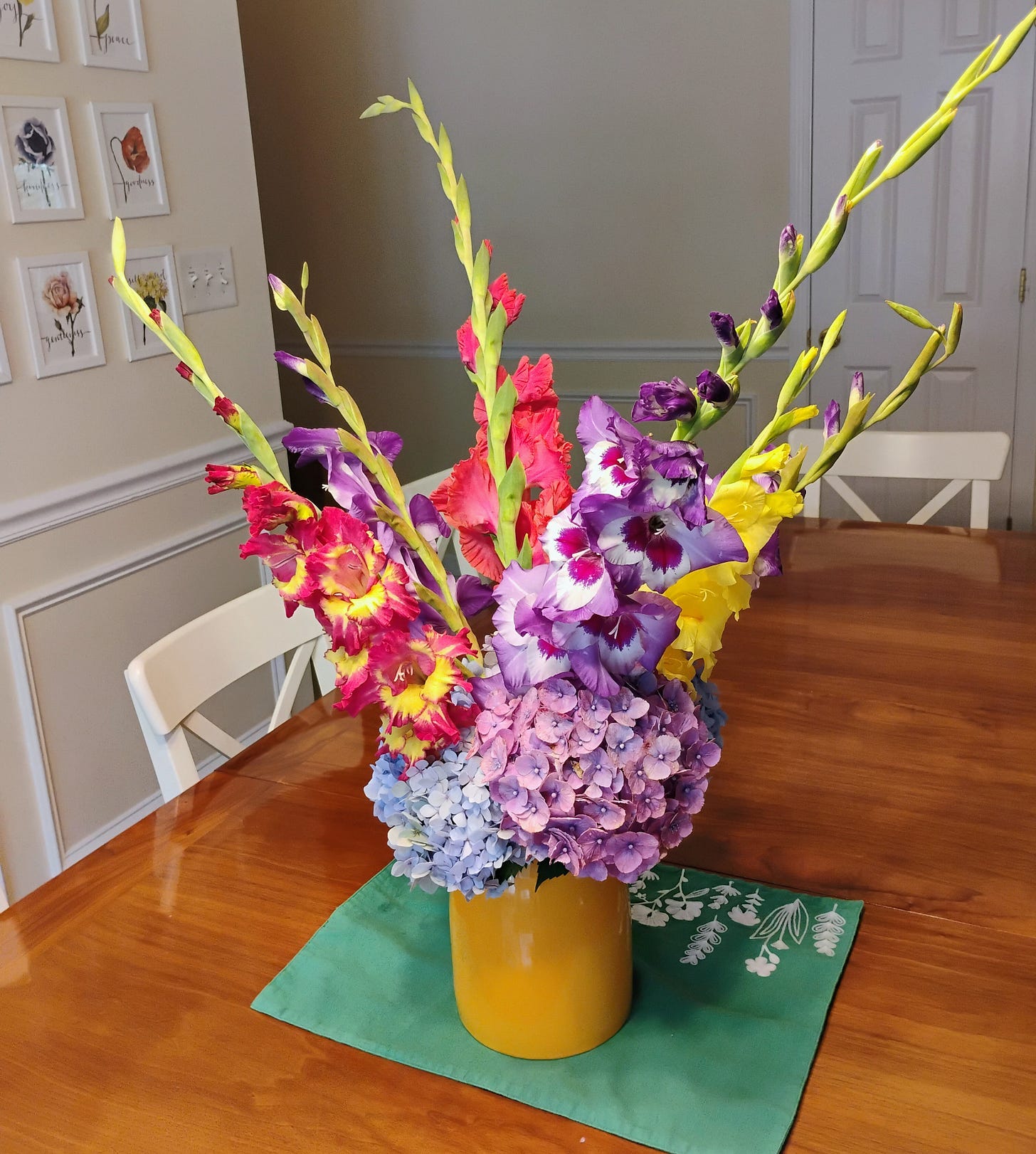Ten years ago - on June 14, 2015 - I walked through the doors of an Anglican church for the first time. I did not know it then, but it was one of those life-altering moments: when I walked through those doors, I crossed a threshold and took the first tentative steps of a journey I never expected to take. It’s probably a good thing that I didn’t know it that day - if I had known I probably would have turned right around and run right back out of those doors screaming. It turns out that it is actually a kindness that the Lord does not always show us the ten-year plan up front.
We came to visit this Anglican church in the wake of our return from Cameroon in a state of deep burnout (I wrote about this here a few weeks ago). But the story really began before that, as we began raising our young children overseas. In those overseas years, we did not have access to things like Sunday School and VBS, so we went searching for ways to be intentional about the way we discipled our children at home. This led us to the traditions of the Church Year - things like using an Advent wreath and the season of Lent that prepared us for Easter. In more recent years, Protestant-based family resources for the church year have proliferated, but at the time that my own children were small, and within the confines of the limited internet access we had overseas, all I could find were Roman Catholic based resources. I took these and adapted them to be appropriate for our own family use, and it was fine. But, it also led me to the assumption that if you wanted to be a part of a church community that participated in these liturgical traditions together, one had to convert to Roman Catholicism - a theological leap I knew that I could not make. So I contented myself doing what I could at home.
A few years later - during the years we lived in Cameroon - James KA Smith’s book Desiring the Kingdom made the rounds in the intellectually-minded homeschool mom circles that I moved in online. He makes the case that it is our habits - our liturgies, if you will - that form and shape us in more powerful ways than the ideas that we feed our minds. We’re not “brains on sticks” - we are whole people, embodied creatures - and thus the project of discipleship needs to be more holistic than merely teaching correct ideas and doctrines. And despite the fact that Smith himself is part of the Reformed tradition, he argues quite persuasively for liturgical forms of worship: that it is these repetitive habits and patterns of worship that have a powerful effect of forming and shaping us in ways that orient our hearts towards God’s Kingdom and away from the ‘liturgies’ of popular culture that warp our souls.
I will admit that this book made me a little bit mad the first time I read it….but it also opened up some questions that wouldn’t let go. At the time, we were attempting to attend and get involved in a French-speaking Cameroonian church with little success. It was increasingly a fight to get our kids to go (and if I’m honest, to get myself to go). We dreaded Sundays. Was this the “liturgy” I wanted to shape my kids? I also was beginning to recognize my own sense of burnout and spiritual dryness and wondered if I myself needed something different - if there was something inadequate in the spirituality I had received from my own somewhat legalistic upbringing. But again: as intrigued as I was, I did not know where such a thing might be found.
It was around the same time that I heard a podcast interview. I can’t tell you now what podcast or who was being interviewed. But part of the conversation was about the relatively newly formed Anglican Church in North America - which married the historic, liturgical traditions that I had become so intrigued by AND sound Biblical theology rooted in the Protestant Reformation. This was the first time I had heard that any such thing existed. Curious, I went to the internet and - knowing that we intended to spend our upcoming furlough in the Charlotte, NC area - I Googled “Anglican Churches in Charlotte”. Two came up in my search: the closer of which was King of Kings.1 I clicked on their website and discovered that they posted their sermons online. So I started listening.
Every word I heard was a breath of fresh air - filled with grace and truth. Most of the time it was the senior pastor who preached, but occasionally the associate pastor did too - sometimes mentioning his five children in sermon illustrations. (This will become significant later!) Listening to those weekly sermons got me through those last few incredibly difficult months in Cameroon. It was a foregone conclusion that once we arrived in the States and settled into our apartment, we would go visit that church.
And on June 14, 2015 - that is what we did.

I remember the ride in the car that Sunday morning. We were already sold - at least philosophically - on trying out a more liturgical form of worship. We had been listening to sermons online for months and found them theologically sound. I remember praying earnestly that the people would be nice - if the people were nice, it was possible that we could make this our new church home without having to spend months visiting different churches, an idea I couldn’t stomach in my current state of burnout.
And so, we walked through those doors. People were so kind to us, and not in that fake-Southern-nice kind of way. When they found out we were recently home from Cameroon - something that we really did not want to talk about much at that point - no one pressed for questions or put us up on the missionary pedestal as we had experienced in other places. It was a relief: a blessed, blessed relief.
Ironically enough, the senior pastor whose sermons we had been listening to online for all those months had just left for a summer sabbatical. It was the associate pastor with the five kids who greeted us and who preached the sermon that morning. And the text of his sermon that morning was the text of the “Comfortable Words” : beautiful words of assurance that I would later learn came right out of the text for the Communion liturgy.
Come to me, all who labor and are heavy laden, and I will give you rest. (Matthew 11:28)
God so loved the world, that he gave his only-begotten Son, that whoever believes in him should not perish but have eternal life. (John 3:16)
This saying is trustworthy and deserving of full acceptance, that Christ Jesus came into the world to save sinners. (1 Timothy 1:15)
If anyone sins, we have an advocate with the Father, Jesus Christ the righteous. He is the propitiation for our sins, and not for ours only, but also for the sins of the whole world. (1 John 2:1-2)2
He spoke of a gospel that offered us rest and safety: not more burdens. It was the balm that my weary, burned-out soul needed. For years, I had carried the weight of legalistic expectations: sure, you were saved by grace - but then it was up to you to do the right thing and keep God happy. The emotional and spiritual weariness that I brought home from Cameroon stemmed from a sense that if I did anything wrong or admitted that I did not want to stay on the mission field any longer God would be angry with me. These Comfortable Words assured me otherwise.
And then: that wasn’t the end. After that sermon, I received Communion in the way it is practiced in the Anglican Church for the first time: being first assured of God’s love and grace and forgiveness and then approaching the altar with nothing but open hands to receive that in a tangible way. In a mysterious way that I cannot explain, Jesus is present in that moment.3 It was powerful and healing in ways I didn’t know were possible. And as the weeks went on - as this pattern of worship became a habit - I found my defenses softening. I felt my soul reviving. I found myself no longer constantly looking over my shoulder, wondering if God was mad at me. I found the truths of the gospel that I had long embraced in my mind working their way into my heart.
By that fall, we had made the decision not to go back overseas, so we settled into this church family for the long-haul. My children became fast friends with the five children of that associate pastor - and over time our families as a whole became those kind of friends that you treat like family (this is still true 10 years and 3 moves later). As we rested and healed, we got more involved in the life of the church. I started teaching children’s Sunday School because this is what I had always done in church - as had my mother before me. I joined the worship team. I was constantly asking what theological books I should read as I explored questions raised by this shift in denominational tradition. Turns out that that associate pastor was also a bit of a theology nerd who loved making recommendations and then chatting with me about what I was reading after worship team practices on Thursday evenings.
It was in the course of one of these Thursday evening book chats that he asked: “Jen, have you ever thought about teaching adults?”
I had not…and the story of what came out of that conversation is a long story all its own for another day. But suffice it to say that it was that little conversation that “opened the can of worms” that led me down that path of shifting my teaching focus from children to adults, which led to starting to take seminary classes, and ultimately down the path of pursuing ordination and pastoral ministry. (This is the part that would have sent me back out that door screaming 10 years ago if I had known. Not something I ever saw coming!)
Part of what informs that call to ordained ministry is not just wanting to be able to teach (one does not need to be ordained to have a fruitful teaching ministry), but wanting to be able to offer to others that healing balm that I found in the Eucharist - wanting to be able to minister not only to minds but also to hearts. I’m not under any illusions that the Anglican Church in North America is perfect - it absolutely is not. I’ve been on the receiving end of some hurtful things in the ACNA context and know the painful stories of others. But when we are functioning well: we offer something beautiful that is worth guarding so that others can experience it too. It’s worth the messy work to make that available. It’s worth the messy work to see it flourish and grow.
I didn’t know what I was getting into when I walked through those doors 10 years ago, but I am so very grateful that I did.
Until Next Time,
May the peace of God, which transcends all understanding, guard your hearts and your minds in Christ Jesus. (Philippians 4:7)
Jen
Bits and Pieces:
Reading/Watching/Listening:
I’m really enjoying this serial novel, Funny Games We Used to Play, from Shawn Smucker. Four chapters in, and I am starting to anticipate when this drops in my inbox on Thursdays. (Hint: the old woman in the story is Susan from Narnia!).
My daughter is also sharing some of her fictional writing here. She is a great writer and would be greatly encouraged if you gave her a follow.
Taking Delight:
These incredible flowers came partly from my yard and partially from our neighbor’s and were arranged by my youngest daughter.
Thinking About:
“There’s nothing more satisfying than laboring alongside other people to accomplish a shared goal.”
~Elizabeth Rush, The Quickening4
Sadly, this once vibrant church community closed its doors in 2021, so you will not find it in an internet search today. Thankfully, we found it before that happened. There are more Anglican churches scattered around the greater Charlotte area now- I have attended and/or served in 4 of them.
From The Holy Eucharist, Renewed Ancient Text in the 2019 Book of Common Prayer, 130-131.
If you have read Beth Moore’s memoir All My Knotted Up Life, she describes beautifully her first Anglican communion service after all of the horrific church-hurt she experienced. She put into words what I cannot.
Elizabeth Rush, The Quickening, 237









Mmm you know I love this friend, and find so many parts of my own story echoed!